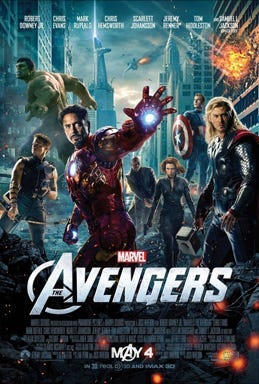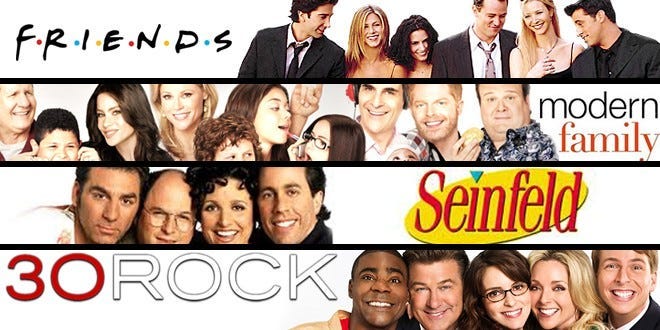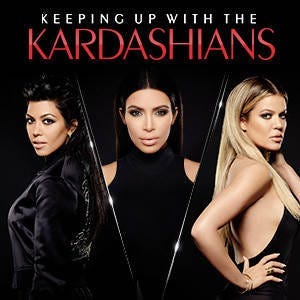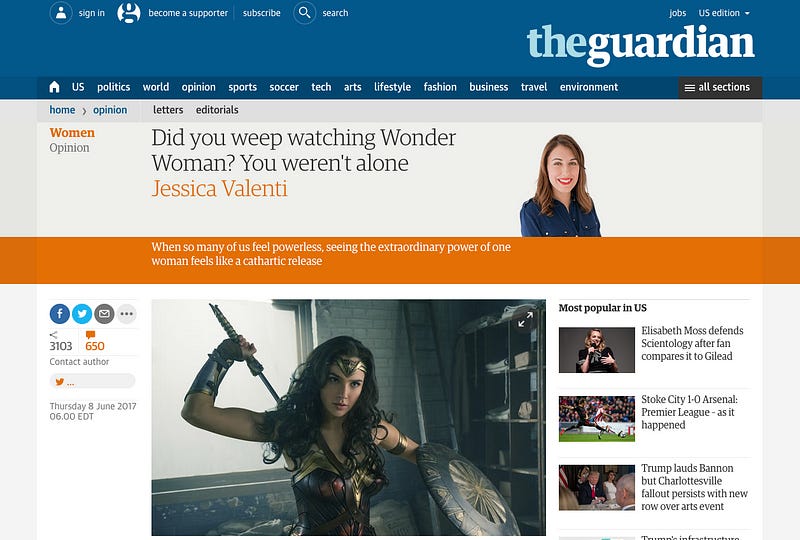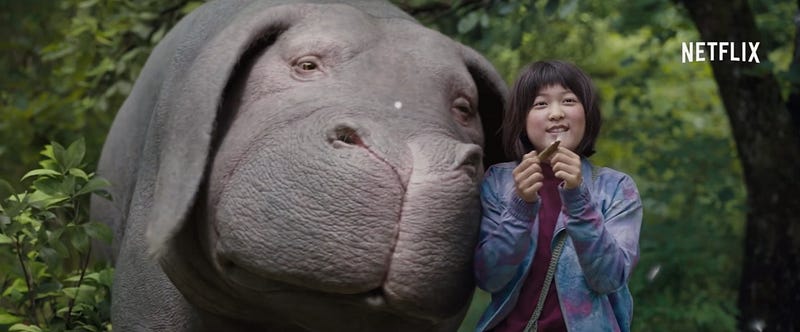The Case for Vegan Entertainment
How Hollywood can become a force for animal rights
When you think of Hollywood, what do you think of?
Big budget blockbusters…
Your favorite sitcoms and dramas…
Trashy reality shows…
Basically, escapism, thrills, laughs, meaningless fluff, and vegging out. Which is all true, of course.
But it’s also a lot more than that.
This newspaper piece is titled, “Did you weep watching Wonder Woman? You weren’t alone.” There were a number of pieces like this in newspapers all across the country and around the world when Wonder Woman came out. It was such a huge deal to see a female superhero big budget blockbuster that people, especially women, were crying tears of joy about it. We saw a similar effect with Black Panther as well.
Storytelling
At its core, Hollywood is about storytelling. And storytelling shapes a lot. It shapes our opinions, our culture, our core values, our norms — it shapes our whole world.
It tells us who the heroes are, and who are the villains. It tells us about right and wrong. It tells us what’s normal and not normal. It tells us what’s hip, cool, and lame.
And storytelling is also a big part of why awful things are perpetuated in society for so long. Like gun violence is cool. Smoking is cool. Meat is manly. Meat makes you strong. It’s not Thanksgiving without a dead turkey. Animals live on happy farms. And on and on. So if animal rights advocates don’t tell our stories, you can be sure the other side will continue to tell theirs.
Are We Telling Our Stories?
In terms of non-fiction, we are definitely starting to tell our stories. Earthlings. Speciesism: The Movie. Cowspiracy. Seaspiracy. What The Health. Dominion. Unlocking the Cage. The Game Changers. Punk Rock Vegan Movie. And more.
But what about fiction? Fiction is a much bigger part of Hollywood than non-fiction, and fiction can be much more powerful as well. Oddly enough, with fiction, underlying messages can actually get past our psychological and political and prejudicial defenses more. If done right, we don’t push it away as propaganda. It’s just a story that makes us think and feel.
Unfortunately, we don’t have the same record for vegan fiction that we have for vegan non-fiction.
There are of course a number of family animation films that have positive animal characterizations, and they are certainly already helpful. Nevertheless, we’re still at the early stages for films that are pro-vegan and pro animal rights.
Bold Native was a 2010 independent film, but it didn’t get wide release. In the UK, the comedian Simon Amstell was able to make the mockumentary, Carnage in 2017. Carnage is set fifty years in the future and, using comedy, tells the story of how the world turned vegan and is now dealing with people’s guilt over what they once did.
Much more well known is Okja, which isn’t even a fully vegan movie, that tells the story of a genetically modified superpig named Okja, and the farmer girl who doesn’t want to send her to slaughter. The movie is an action thriller with plenty of comedic elements.
This is a video from Netflix’s marketing campaign for Okja.
Life Before Okja vs. Life After | Life before OKJA vs. Life after | By Netflix | Facebook
2.9M views, 9.5K likes, 1.1K loves, 11K comments, 8.2K shares, Facebook Watch Videos from Netflix: Life before OKJA vs…www.facebook.com
And this is a real-life interview at a Save Vigil, where people go to slaughterhouses to bear witness and raise awareness of what’s going on there. Fiction not only opened this woman’s eyes, but turned her into an animal rights activist.
In fact, Okja is now a trope in itself — for example, an episode of the show Poker Face involves a Texas BBQ joint owner who decides to go vegan after watching Okja.
Finally, a new indie movie that I hope will be an excellent addition to the vegan fiction space is Coffee Wars, about a struggling vegan coffee shop owner trying to win a barista competition without using cow’s milk.
The Power of Entertainment
There already exists a long history of TV shows that were momentous with respect to other justice movements, such as The Cosby Show for African Americans, Ellen and Will & Grace for LGBT, Modern Family for gay marriage, and numerous other shows as well.
Some of the many benefits of entertainment include:
It’s about individual characters, so it defeats stereotypes and otherization, and creates true empathy. We get to see that those who have been otherized are actually just like us in so many ways.
It disarms prejudice, as it’s hard to hate someone when being entertained by them or laughing along with them.
It can seep through and break through hard shells that people put up.
It engages rather than shuts down.
It has massive reach potential — way more people watch it.
It has a coolness factor. People want to be a part of it.
It helps create new social norms.
The material doesn’t even have to hit issues completely on the head to have a hugely positive effect. The Cosby Show was simply a normal sitcom with African American lead characters. Ellen was a normal sitcom where the main character came out as gay. Modern Family was a normal sitcom that included a gay married couple.
Of course, the material still has to be very good. It has to be professional, well-written, engaging, and entertaining, without making the viewer feel like they are being preached at or lectured. It has to include fleshed-out characters with quirks and flaws who we want to follow, and stories that grab our attention and make us want to watch. And it can’t be safe and boring.
The State of the Entertainment Industry
To describe the current state of Hollywood with respect to veganism, I often use the famous quote:
“First they ignore you, then they laugh at you, then they fight you, then you win.”
Where we are right now is in a mix of the middle two. Visibility is now increasing, and there’s a mix of laughing at us and fighting us, with a few rare instances of winning.
Personal choice is big. Stereotypes and mocking still abound, but veganism is much more okay now as a personal choice, as long as the majority non-vegan norm remains in the primary position. Veganism is also commonly divorced from animals, and portrayed as a healthy but pleasureless diet rather than being about ethics.
Where we want to go, of course, is a place where the vegan characters are the leads who we root for and want to emulate. We want to normalize vegans and veganism, as opposed to vegans being weird and “the other” as they currently are in society. And beyond wanting people to not be prejudiced against vegans, we more importantly want people to stop being prejudiced against animals, become vegan themselves, and support a shift to a vegan world.
Barriers
What are some of the barriers moving forward?
One significant barrier is that the ad-driven networks make a huge chunk of their advertising money from animal exploitation industries. It’s not a coincidence that Okja was on Netflix. But while streaming platforms are now becoming dominant, they are also starting to add advertising pricing tiers back in, so it’s unclear how much that development will negatively affect things going forward.
Another barrier is that most people who work in Hollywood are still not vegan and can even get very defensive on the topic, just like the general population.
There also aren’t enough vegan writers and showrunners pitching good projects with positive portrayals of vegans, veganism, and animal rights. And furthermore, there is no support network in place for up-and-coming and mid-level vegan writers to help them be in a better position to get their pro-vegan and animal rights scripts out there. Even if they have great vegan-positive material, they’re not big enough in the industry and will often struggle to get their work out there widely enough to sell it.
And finally going independent is very cost prohibitive if you want to make a product that’s Hollywood-level professional, both in terms of making it, but also marketing and distribution. If you don’t have the resources, you basically have to start a lot smaller on YouTube / Facebook / TikTok / etc. and hope that you’ll be able to grow from there, but it’s still quite difficult to get enough exposure to be noticed.
Where To Go From Here
While we still have a long way to go, there are specific things we should already be doing to help build a space for pro-vegan entertainment.
Network Building:
First, we need organizations to help facilitate networking and collaboration among like minds who work in entertainment. People need to know that they’re not the only one out there. And they need to be able to build up their networks to collaborate and help each other move their projects forward.
Production Companies:
Second, just as there are production companies that exist to champion projects for other justice causes, we need vegan production companies to help good pro-vegan and animal rights projects get found, commissioned, pitched, sold, made, and distributed. We need to start creating an ecosystem to nurture the creation of great entertainment with positive portrayals of veganism and animal rights. Yes, I’m talking to you, celebrity Hollywood vegans and allies, and producers, executives, showrunners, directors, and investors. Pro-vegan and animal rights projects won’t get made until there are places to sell to and partner with on them.
Grants and Competitions:
Third, we should provide more grants to help facilitate the creation of professional pro-vegan and animal rights fiction material. And we should create a script competition that can help identify great material and give it a leg up in getting noticed.
Finally, it’s important to note that we can’t rely on the non-profit animal charities for larger and wider scale vegan entertainment. They can make one-off videos, sure, but they can’t really do movies, sitcoms, or dramas, for example. Imagine if it was The NAACP presents The Cosby Show. Or GLAAD presents Will & Grace. That immediately takes things out of fiction and puts it back into propaganda territory. So pro-vegan entertainment is not going to come from them. They should support and help facilitate, absolutely, but it’s not something they can publicly lead.
A Few Tips
Now, what if you’re not a Hollywood A-lister or mogul yourself? Let’s talk about a few things you can do as a viewer to help grow a vegan Hollywood:
Share vegan entertainment:
Don’t just share downer after downer, animal slaughter video after animal slaughter video, which unfortunately turns many people away. Mix things up instead, by including a lot more humor and entertainment as well. That includes Hollywood stuff like Okja, or good independent material as well.Support the creation of pro-vegan projects:
Many of us unfortunately still don’t recognize that this is absolutely vital work needed to help change society, along with the more traditional charitable animal organizations. We’re a species that operates on stories. Right now, animal exploitation stories are the ones shaping everything about our culture. We should support the creation of pro-vegan and animal rights stories, recognize its importance as an area we need to grow, and become a patron of the vegan arts.Demand more vegan projects:
Write to TV networks asking for more shows with positive vegan representation and positive portrayals of veganism and animal rights. And if you know anyone in Hollywood, nudge them to pitch, develop, and create more projects that move things forward. Especially nudge famous vegans to make such projects. Some of them have their own production companies. They should already be actively developing and trying to option, pitch, and sell shows with positive vegan and animal rights portrayals and messages.
A Few Don’ts
Finally, here’s a few don’ts:
Don’t forget entertainment is subjective:
Don’t confuse “not my taste” with “I need to protest this.” All entertainment is highly subjective. Someone’s favorite show or movie is someone else’s least favorite show or movie, so don’t confuse subjective tastes with black and white and right and wrong. “I didn’t care for it” is the correct response in almost all cases rather than feeling the need to protest or trying to shut something down because it wasn’t perfect.Don’t add extra perfection demands:
Don’t place extra perfection burdens on projects created by vegans (e.g., was everyone working on the project vegan?, did they donate everything to charity?, etc.). Realize that it’s so much harder to make something if you’re an independent vegan with little resources compared to the big studios, so don’t put up a giant magnifying glass to endlessly scrutinize a vegan project while not scrutinizing big budget non-vegan stuff. It’s not fair, and it’s not helpful in getting more much-needed pro-vegan projects made.Don’t focus on the negative:
Don’t come off as constant complainers when things aren’t absolutely perfect. Celebrate forward direction and intent. One can usually tell if the intention behind something was good or bad. And when in doubt, give people the benefit of the doubt.
Remember, we need a lot more entertainment in this space, not less. While it may not seem like it right now, if we help make it happen, it is possible for Hollywood to start becoming a powerhouse for veganism and animal rights.
If anyone is working in this space and wants to reach out, you can contact me at desertedisland at att dot net.


